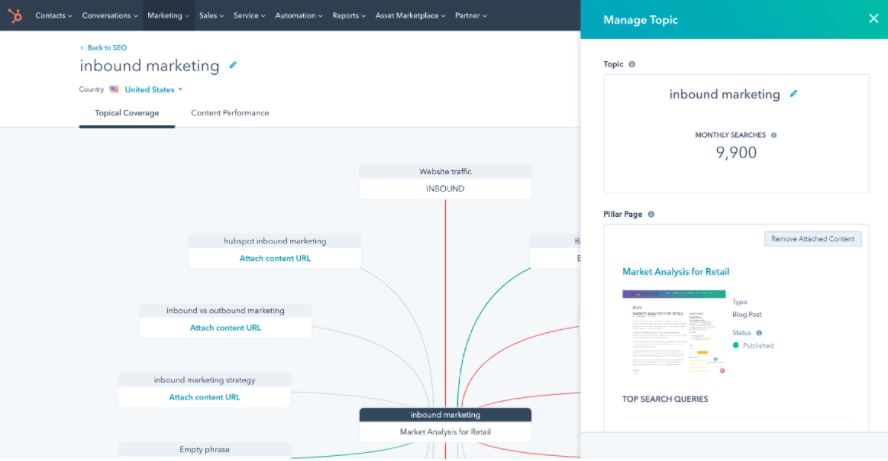 If you’re doing any kind of content marketing, a marketing platform can make a big difference in your results.
If you’re doing any kind of content marketing, a marketing platform can make a big difference in your results.
It can help you focus your marketing efforts, make the most of your budget, and — perhaps most importantly — make things a lot less stressful.
Over and over again, I’ve seen that companies get more value out of their content simply by using a marketing platform.
What is a marketing platform?
A marketing platform is a tool that allows organizations to manage all their digital marketing efforts — website pages, blogging, SEO, email marketing, and so on — in one place, including analytics and reporting.
If you don’t yet have a marketing platform, you’re probably using several different tools to manage all the content your team is producing. Your website and blog might be hosted on WordPress, your emails through Mailchimp, and your social media through a tool like Buffer or Hootsuite.
Keeping tabs on all those different platforms and content pieces (blogs, emails, ads, social media) means a lot of time wasted toggling back and forth. I know, because I’ve managed all of these different creatives for my clients.
It also means there’s no clear way to measure the success (or failure) of your content or see what’s working. You’re essentially throwing darts blindfolded and hoping something will stick — not a great use of your time or resources.
A marketing platform, on the other hand, brings all of your marketing together under one roof. You can manage your website, emails, ads, and any other content you’re producing and collaborate with your team in a single place. And you can measure the results of your efforts to take the guesswork out of content strategy and creation, so that you can focus your time and marketing budget on campaigns that bring the most return.
What’s the difference between a marketing platform and content management system (CMS)?
Many people confuse marketing platforms with content management systems (CMS). While the two might sound a lot alike, they’re not the same thing.
A content management system is a tool that allows you to build a website without coding it from scratch. WordPress is an example of a CMS.
A marketing platform, on the other hand, may include features of a CMS — but its main purpose is to help you improve your marketing. Even if you already have a CMS like WordPress, you’ll still most likely need a marketing platform.
Which marketing platform should I use?
There are lots of options out there marketing platforms out there, but the one I use and recommend to all my clients is Hubspot. Here are 8 reasons why I think Hubspot is the best platform for B2B SaaS companies.
Why go with Hubspot
1. The analytics are incredibly useful
If you’ve ever logged in to Google Analytics, then you know it’s not the most intuitive platform. It’s hard to locate the information you need. And, building CEO-ready reports is incredibly time-consuming. That’s not to say Google Analytics isn’t a useful tool, but it does take a lot of time and skill to master — and that’s time that could be better spent on creating, publishing, and promoting content.
Hubspot solves this problem by making all of your most important metrics available in intuitive, drag-and-drop dashboards. You can easily customize your reports to show the data you need. It’s much more user-friendly, so that even casual users who don’t spend a lot of time in the platform can locate the information they need.
 For marketing teams who need to show ROI, Hubspot is the perfect tool because it allows you to measure the impact of every page, piece, and social media post on your brand’s leads and ultimately customers.
For marketing teams who need to show ROI, Hubspot is the perfect tool because it allows you to measure the impact of every page, piece, and social media post on your brand’s leads and ultimately customers.
And that’s where the real value of Hubspot comes in: you get insights in real time that allow you to adjust and monitor how your audience responds.
You can see which topics are driving people to your website, and then drill down deeper to understand how people are interacting with each piece of content. For example, let’s say you’re creating a blog post. You can add a call-to-action to request a demo (no plugins or coding required). Using the analytics tools in Hubspot, you can see how many people viewed your call-to-action, clicked, and ultimately filled out a demo request. In this way, you’re able to figure out exactly what’s driving results so you can do more of what works.
This can also help you make the most of your efforts when creating new content. For example, when building out lead nurture workflows, I like to go back and look at the journey previous customers have taken and which pages and pieces they view before booking a demo or sales call. This helps me know exactly which pieces of content are driving leads and build lead nurture sequences that align with the buyer’s journey.
You can also find data about specific contacts and customers so you can see which types of content they’re consuming and what they’re interested in and hand this information off to sales.
2. It connects with the other tools you use
Hubspot’s integrations are another feature that sets it apart from other marketing platforms. If you have other tools in your company, you want your marketing platform to integrate with them. Let’s say for example your sales team is using Salesforce or Microsoft Dynamics. You can easily share data between Hubspot and these other platforms to get a holistic picture of your company’s marketing performance alongside other metrics that matter.
3. Hubspot includes tools for customer support and sales
Marketing, sales, and support are all part of the customer experience. So if you want to provide a seamless customer experience from first touch, Hubspot is the platform for you. With your entire team in one tool, you can integrate all of your efforts. And it will most likely cost less than purchasing all three of these tools separately.
4. Hubspot is great for SEO
Hubspot’s marketing platform offers a number of built-in SEO features based on current best practices. The SEO tool lets you create topics, discover subtopic keywords, and link related content. This gives you a visual overview of how all your content and SEO is working together.
 When you create a blog post in Hubspot, it walks you through the process of optimizing your post. Things like keywords and topics, as well as more behind the scenes things like meta descriptions, heading tags, and alt text.
When you create a blog post in Hubspot, it walks you through the process of optimizing your post. Things like keywords and topics, as well as more behind the scenes things like meta descriptions, heading tags, and alt text.
For teams without a lot of SEO expertise, these tools make it really easy to optimize your posts. But even as someone who does on-page SEO all the time, I’ve found this serves as a helpful reminder and checklist before publishing.
5. Hubspot is perfect for email marketing
Hubspot’s email tools allow you to manage your contacts, maintain segmented lists, send emails and track the results of your campaigns all the way through to the sale. This is something that simply isn’t possible with a standalone email marketing tool.
Hubspot has all the features marketing teams have come to expect from an email marketing platform, including A/B testing, subject line recommendations, and merge tags for personalization. They also have automation workflows so you can set up a new subscriber welcome series or an onboarding series, for example. And again, these tools are totally intuitive (more so than most of the email marketing platforms I’ve worked with).
6. It’s user-friendly
I’ve worked in a lot of different marketing platforms for my clients, and I have yet to find one that’s as intuitive and easy to use as Hubspot.
Even if you’ve never logged into the platform before, you can have a new blog post up and running in a matter of minutes. And if you run into trouble, Hubspot’s help documentation is some of the best around.
Of course, there are more advanced features for power users as well, such as the ability to configure complex reports on multiple metrics, but these features don’t get in the way if you’re just looking to do the basics.
7. You don’t have to go it alone
Paid Hubspot customers get access to a dedicated account rep to help you get set up and work through any challenges you might have. Personally, it took me a while to take advantage of this feature. As a marketing professional myself, I wasn’t convinced I’d get much value from this service. Boy, was I wrong!
The first time I met with the Hubspot account rep, I was blown away by the level of knowledge and skill she had. She really acted as a collaborative partner with me, brainstorming new strategies and techniques to try and increase leads during a slow season in my client’s business. She even took the time to record a video walkthrough of some analytics to help break down what might be happening and how to solve it.
In addition, Hubspot account reps work with a lot of different businesses — so they get to see what other companies are doing and what’s working well. They’ll be able to share best practices that you can use to grow your business as well.
8. It’s free
There’s a free version of Hubspot! It includes features like forms, email marketing, ad management, landing pages, and more. And the best part is, it’s not a free trial — you can keep using Hubspot’s free features forever. This is great for solopreneurs and startups who don’t have a lot of cash.
If, however, you’re an established B2B business — as most of my clients are — I highly recommend investing in the paid version. The paid version of Hubspot includes a lot more features that will help organize your data, capture leads, and close more sales. Professional plans start at around $800/month and will make your marketing efforts so much more effective. Even if Hubspot helps you secure one new client, it will easily pay for itself.
Final thoughts
If you want to go deeper, there are tons of cool features like lead scoring, conversations, and even free training courses you can explore. This article barely scratches the surface of how powerful Hubspot is for marketing.
I could go on for days, but I’ll leave you with this: Investing in a marketing platform not only makes your marketing team more productive but will ultimately help you create better content that drives leads and sales. And, in my experience, there’s no better platform to help you do that than Hubspot.
If you have questions or want to have a chat about Hubspot, feel free to book time on my calendar.
 I'm Christine Lellis, a copywriter and certified content marketer from Michigan.
I'm Christine Lellis, a copywriter and certified content marketer from Michigan.